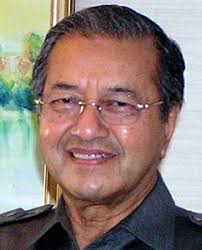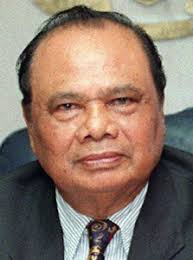By Leslie Lau
Consultant Editor
KUALA LUMPUR, Nov 25 — Tun Dr Mahathir Mohamad continued his campaign today against money politics in Umno by questioning the determination of current party leaders in ridding themselves of the culture of vote-buying.
money politics in Umno by questioning the determination of current party leaders in ridding themselves of the culture of vote-buying.
He admitted that vote-buying also existed in his time as party president, but it was never as openly practised as it is now.
"Incidents of bribery are now widespread and open until the public looks upon Umno politics with disgust. That did not happen before.
"It never came to a point where the party president is accused of money politics. It never happened to such an extent that the disciplinary board receives up to 900 complaints," he wrote in his chedet.com blog today.
Dr Mahathir has grown increasingly vocal over the issue of money politics, or vote-buying, in the current Umno election campaign.
He has openly accused party leaders of using money to secure nominations for top posts, and has threatened to name those he claims are guilty of bribing their way to high office.
The former prime minister has also warned Umno that it stands to lose heavily in the next general election if the practice of vote-buying continues.
He said today that the fact that money politics existed during his time cannot be used to excuse or legitimise the openly corrupt practises under the current party leadership.
"I admit that when I was Umno president and prime minister, there was already money politics," he said in acknowledging accusations that it was under his watch that vote-buying crept in to become part of the party's culture.
"This was clear when Tun Ghafar Baba (left) and I were challenged," he said referring to his slim victory in the 1986 Umno elections in which the two men defeated by a slim margin Tengku Razaleigh Hamzah (center) and Tun Musa Hitam (right).
He said that was the reason why a new system was introduced in which each nomination for the top posts received bonus votes.
Later on, he said a minimum requirement, or quota, was introduced in which candidates had to receive a certain number of votes before they are allowed to get on the starting block.
He said it is clear that even the current quota system has not been successful in getting rid of vote-buying.
If leaders known for engaging in money politics are elected into office it will lead to Umno's defeat in the next general election.
"The public knows who they are even though it is hard to prove they are paying for votes," he said.
Consultant Editor
KUALA LUMPUR, Nov 25 — Tun Dr Mahathir Mohamad continued his campaign today against
 money politics in Umno by questioning the determination of current party leaders in ridding themselves of the culture of vote-buying.
money politics in Umno by questioning the determination of current party leaders in ridding themselves of the culture of vote-buying.He admitted that vote-buying also existed in his time as party president, but it was never as openly practised as it is now.
"Incidents of bribery are now widespread and open until the public looks upon Umno politics with disgust. That did not happen before.
"It never came to a point where the party president is accused of money politics. It never happened to such an extent that the disciplinary board receives up to 900 complaints," he wrote in his chedet.com blog today.
Dr Mahathir has grown increasingly vocal over the issue of money politics, or vote-buying, in the current Umno election campaign.
He has openly accused party leaders of using money to secure nominations for top posts, and has threatened to name those he claims are guilty of bribing their way to high office.
The former prime minister has also warned Umno that it stands to lose heavily in the next general election if the practice of vote-buying continues.
He said today that the fact that money politics existed during his time cannot be used to excuse or legitimise the openly corrupt practises under the current party leadership.
"I admit that when I was Umno president and prime minister, there was already money politics," he said in acknowledging accusations that it was under his watch that vote-buying crept in to become part of the party's culture.
"This was clear when Tun Ghafar Baba (left) and I were challenged," he said referring to his slim victory in the 1986 Umno elections in which the two men defeated by a slim margin Tengku Razaleigh Hamzah (center) and Tun Musa Hitam (right).
He said that was the reason why a new system was introduced in which each nomination for the top posts received bonus votes.
Later on, he said a minimum requirement, or quota, was introduced in which candidates had to receive a certain number of votes before they are allowed to get on the starting block.
He said it is clear that even the current quota system has not been successful in getting rid of vote-buying.
If leaders known for engaging in money politics are elected into office it will lead to Umno's defeat in the next general election.
"The public knows who they are even though it is hard to prove they are paying for votes," he said.





No comments:
Post a Comment